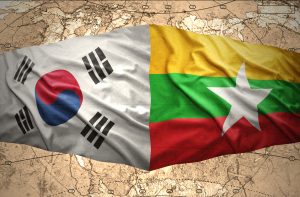Prior to the Tatmadaw’s illegitimate takeover of the elected government on February 1, 2021, South Korea and Myanmar had seen growing connections in various civil and governmental sectors, ranging from infrastructure to cultural exchange. One notable area of cooperation has been the Shwe Natural Gas Project, a large-scale natural gas extraction project in the Bay of Bengal. A consortium of six companies runs the project, two of which are South Korean private and public enterprises, POSCO International and Korea Gas Corporation (KOGAS), which hold 51 percent and 8.5 percent of the consortium’s share, respectively. The Shwe gas field project posted sales of over $600 million in 2020.
The Shwe gas field is now at a controversial crossroads amid heightened political tensions in the aftermath of the coup. The point in question is that one of the shareholders is Myanma Oil and Gas Enterprise (MOGE) – Myanmar’s national oil and gas company. This prompted concerns that the gas business is financing the illegitimate military regime. Once a beacon of prosperity and achievement, the Shwe Natural Gas Project is increasingly scorned by civil societies at home and abroad. Myanmar’s deposed civilian government and human rights groups continue to demand that the South Korean energy firms sever ties with businesses associated with the Myanmar military, including MOGE.
From the perspective of justice, civic groups’ demand is fair and proper, as they seek to hold accountable those who are responsible for the sufferings people are facing now. Nonetheless, it would be naive to think that the energy firms would discontinue their businesses in Myanmar. The Shwe field accounted for more than 80 percent of POSCO International’s total revenues in 2020.
Regardless of any change of ownership in the Shwe gas business, the harsh reality is that the people of Myanmar will continue to suffer from the Tatmadaw’s tyranny. Therefore, it is imperative to find a constructive way to minimize the damage to the public. It would be ideal for the companies currently associated with the Shwe gas field to embrace the discourse of ethics and human rights. However, such a rosy scenario is unlikely to unfold in today’s capitalist economy.
Suppose that the South Korean firms suspend their energy operations in Myanmar. The question then arises as to whether the Myanmar military regime would not simply find an alternative operator to recommence drilling for gas. Given the high utilization of Sino-Myanmar Crude Oil and Gas Pipelines, it is reasonable to speculate that Chinese energy firms might step in. In that case, the Shwe gas field would serve as a crucial puzzle piece that adds to China’s Belt and Road Initiative in South and Southeast Asia. In other words, China’s active involvement in the Andaman Sea may be deemed a grave threat to the United States’ Indo-Pacific initiative. In post-coup Myanmar, the gas field would then become a highly contested site presenting complex challenges to those working in the multifaceted nexus of international security, capitalism, and human rights.
The Tatmadaw’s ability to find alternative companies to replace POSCO and KOGAS should not justify the way the South Korean firms do business in the Andaman Sea. However, the reality is that POSCO International and KOGAS are unlikely to pull out of Myanmar, considering the companies hold the most significant shares in the lucrative gas project. The only viable option, then, appears to be pressuring the South Korean firms to at least reduce the degree of their alleged partnership with Myanmar’s state-run enterprises. Again, the role of South Korean civil society is crucial to achieving this difficult task. For example, 104 South Korean NGOs actively advocating for human rights in Myanmar recently held an international roundtable and called for the South Korean energy firms to immediately suspend dividend payments to the Tatmadaw. Their argument is simple and straightforward: Human rights should not be subordinated to commercial interests.
In the face of scathing criticism from vibrant civil societies at home and abroad, the South Korean firms are under pressure to reconsider their business strategies in the Andaman Sea. Such external pressure is seemingly effective, as POSCO International is evaluating the demands made of it, including the suspension of dividend payouts. In addition, POSCO’s affiliate – POSCO C&C – announced its decision to terminate a joint partnership with the Tatmadaw’s Myanma Economic Holdings Public Co. Ltd. (MEHL). The company plans to do this by purchasing MEHL’s stake and gaining full ownership. Of course, one could criticize the fact that the proceeds from the stock sales would transfer directly to MEHL. Still, it is essential to note that such a one-time revenue source might be an inevitable cost of POSCO avoiding further collaboration with the illegitimate military regime.
Beyond the simple goal of profit generation, South Korean companies should look at the stark fact that the people of Myanmar are sacrificing their lives for freedom and democracy. Suppose South Korean companies truly sympathize with Myanmar’s pain and implement their business policies accordingly – in the long run, this will positively affect their businesses when democracy is restored in Myanmar. The South Korean energy firms in the Andaman Sea should keep in mind that respecting the intangible value of human rights is becoming the essential condition for continuing their business in Myanmar.

































